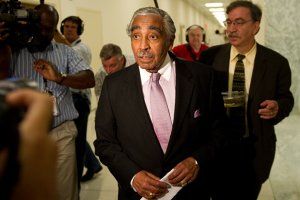
The storied life and career of Charles B. Rangel are at a sad impasse, but how could a man in charge of writing tax policy not pay his taxes? What was he thinking? Did he expect his colleagues in the House to cut him slack because of his seniority? He has served in the House since 1971, and like another lawmaker of that vintage, assumed he could get away with blatant disregard of the rules. Former Chairman Dan Rostenkowski is the cautionary tale. Like Rangel, he chaired Ways and Means, the powerful tax-writing committee, and he was found guilty of supplementing his congressional salary by trading in office postage stamps for cash. He went to jail for mail fraud.
If Rangel doesn't cut a deal that acknowledges wrongdoing on at least some of the 13 counts leveled against him, he too could be looking at jail time. The severity of his situation has been slow to dawn on Rangel, an icon in his New York district, an architect of the Harlem Renaissance as the man who convinced President Clinton to move his office to West 125th Street when he left the White House. Arriving in Congress Thursday morning, Rangel seemed to finally grasp the terrible scenario ahead, saying, "Sixty years ago, I survived a Chinese attack in North Korea and have said that I haven't had a bad day since … But after today, I may have to revise that statement."
Rangel did not attend the meeting of the House ethics committee that laid out the charges against him, choosing to submit a written statement instead. If a settlement is not reached, the equivalent of a trial will get underway in the fall, with Rangel's colleagues and peers acting as judge and jury. The four Democrats and four Republicans that sit on the ethics committee comprise the jury, and with Democrats having promised to "drain the swamp" and uphold higher standards, an 8–0 conviction is likely.
The prospect of a public hanging may yet focus Rangel's mind and prompt him to do the equivalent of copping a plea. But now that the charges have been made public, a proud man almost has to have his day in court. The charges against Rangel are not trivial and include his allegedly illegal acceptance of rent-controlled apartments in New York, including one for his office, and failure to pay taxes on the income he derived from renting a villa in the Dominican Republic. A Democratic lobbyist who knows and likes Rangel says that if he were to put him on the couch, we would learn, "It's Charlie saying FU to The New York Times." The Times broke the stories that are at the heart of the charges against him, and Rangel believes somewhat irrationally, given the nature of his misdeeds, that the newspaper had a vendetta against him.
The young Charlie Rangel, a war hero and a reformer, defeated Adam Clayton Powell Jr., the first African-American elected to the Congress from New York and, like Rangel, an admired role model in his time. As chairman of the Education and Labor Committee, Powell helped pass landmark Great Society and New Frontier legislation under Presidents Johnson and Kennedy, and championed all kinds of pioneering civil-rights legislation, from making lynching a federal crime to challenging the infamous poll tax that prevented Southern blacks from voting. Powell's long and flamboyant career began to unravel in 1967 when the House stopped just short of impeachment and voted to "exclude" him because of ethics violations that included using committee funds to pay for his trips to the Bahamas.
It was 40 years ago that Rangel defeated Powell, and now Powell's son and namesake, a 48-year-old New York City councilman, is challenging Rangel in the Democratic primary in September. Rangel dressed down NBC reporter Luke Russert last week for asking if he feared losing his job, as though the prospect is unthinkable. And maybe if you're Charlie Rangel, and you go back to your district and everybody loves you, such a loss may be unthinkable. The primary is a low -turnout election, and the Adam Clayton Powell name doesn't register the way it once did. Two generations have come to voting age since the House rendered its judgment on Powell, so Rangel could well survive the primary challenge, but it's all the other stuff that could bring him down. Sadly, it already has.
Uncommon Knowledge
Newsweek is committed to challenging conventional wisdom and finding connections in the search for common ground.
Newsweek is committed to challenging conventional wisdom and finding connections in the search for common ground.





